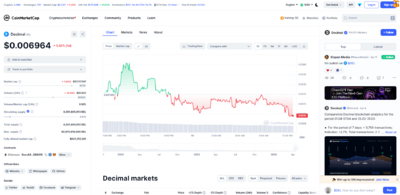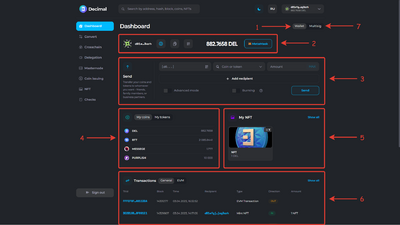Dashboard: Difference between revisions
Jump to navigation
Jump to search
| [checked revision] | [checked revision] |
CryptoUser (talk | contribs) (Redirected page to Manual:Dashboard) Tag: New redirect |
CryptoUser (talk | contribs) (Removed redirect to Manual:Dashboard) Tag: Removed redirect |
||
| Line 1: | Line 1: | ||
# | {{#seo: | ||
|title= Dashboard — Decimal Wiki | |||
|titlemode= append | |||
|keywords= Dashboard | |||
|description= What is a dashboard and why is it needed | |||
}} | |||
[[File:Dashboard Coinmarketcap EN 2024-04-14 12-37-46.png|400px|thumb|right|Dashboard of the [[CoinMarketCap]] service, [[DecimalChain|Decimal]] [[blockchain]] page]] | |||
'''Dashboard''' is the main screen of a service where all information is consolidated and transformed into a graphical [[interface]]. The [[Decimal Console]] offers users all the key analytics on the [[DecimalChain]] blockchain, metrics, statistics, and control elements. | |||
Using dashboards in [[software|software shells]] simplifies the perception of complex [[data|data sets]] and allows for an evaluation of all the essential aspects of the service at a glance. | |||
== Dashboard distinctions == | |||
A dashboard differs from regular reports and infographics. | |||
* A '''report''' reflects the state of data for a specific period in the form of a static summary. The information on a dashboard is '''dynamic'''; it is automatically updated in real-time and interactive. Creating a dashboard once is sufficient for it to provide continuous control over ongoing processes. | |||
* '''Infographics''' provide simplified and visualized data representation, aimed at '''regular users'''. A '''dashboard''' is a '''working tool for specialists'''. It provides a highly detailed summary of all significant processes on a single screen, with a set of processes that can be adjusted by the user. Data visualization on the dashboard can be controlled, for example, by setting a tracking time frame. This allows for tracking trends and determining the factors that caused them. | |||
Dashboards often include tools for generating reports and infographics, such as displaying information in Excel table format. | |||
== Types of dashboards == | |||
* '''Strategic''' — used for macro-analysis of the overall situation or specific indicators. | |||
* '''Analytical''' — demonstrates current trends with a focus on specific processes. | |||
* '''Operational''' — displays real-time operational data changes. | |||
== Dashboard Examples == | |||
[[File:Dashboard 1.png|400px|thumb|right|[[Decimal Console|DecimalChain console]] dashboard<ref>[https://decimalchain.com/docs/en/decimal-console/dashboard/ Detailed explanation of all dashboard elements in our knowledge base].</ref>]] | |||
* [[wikipedia:Yandex.Metrica|Yandex.Metrica]] | |||
* [[wikipedia:Google Analytics|Google Analytics]] | |||
* [[CoinMarketCap]] | |||
* [[Decimal Console]] | |||
== See also == | |||
* [[Decimal Console#Dashboard|Decimal console dashboard]] | |||
* [[Instruction:Dashboard|Guide to using the Decimal Console dashboard]] | |||
== References == | |||
* [https://medium.com/@5000fish/what-is-a-dashboard-ef8b0317d11e What is a Dashboard? | by 5000fish | Medium] | |||
== Notes == | |||
{{notes}} | |||
{{interwiki|ru=Дашборд}} | |||
[[Category:Terminology]] | |||
[[Category:Interfaces]] | |||
Revision as of 11:18, 14 April 2024

Dashboard is the main screen of a service where all information is consolidated and transformed into a graphical interface. The Decimal Console offers users all the key analytics on the DecimalChain blockchain, metrics, statistics, and control elements.
Using dashboards in software shells simplifies the perception of complex data sets and allows for an evaluation of all the essential aspects of the service at a glance.
Dashboard distinctions
A dashboard differs from regular reports and infographics.
- A report reflects the state of data for a specific period in the form of a static summary. The information on a dashboard is dynamic; it is automatically updated in real-time and interactive. Creating a dashboard once is sufficient for it to provide continuous control over ongoing processes.
- Infographics provide simplified and visualized data representation, aimed at regular users. A dashboard is a working tool for specialists. It provides a highly detailed summary of all significant processes on a single screen, with a set of processes that can be adjusted by the user. Data visualization on the dashboard can be controlled, for example, by setting a tracking time frame. This allows for tracking trends and determining the factors that caused them.
Dashboards often include tools for generating reports and infographics, such as displaying information in Excel table format.
Types of dashboards
- Strategic — used for macro-analysis of the overall situation or specific indicators.
- Analytical — demonstrates current trends with a focus on specific processes.
- Operational — displays real-time operational data changes.
Dashboard Examples

See also
References
Notes
This article is available in other languages: Русский